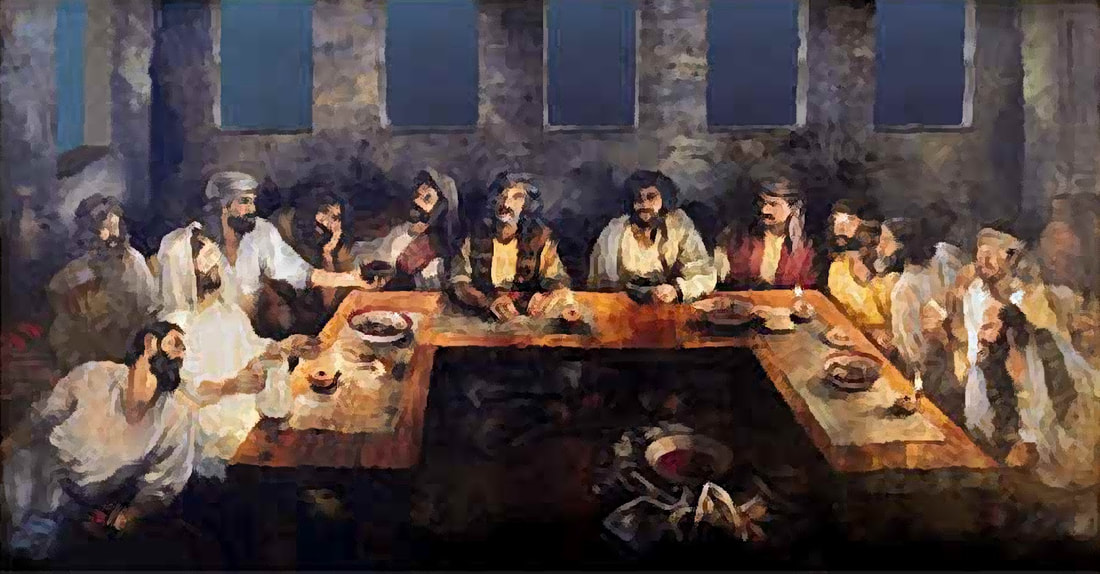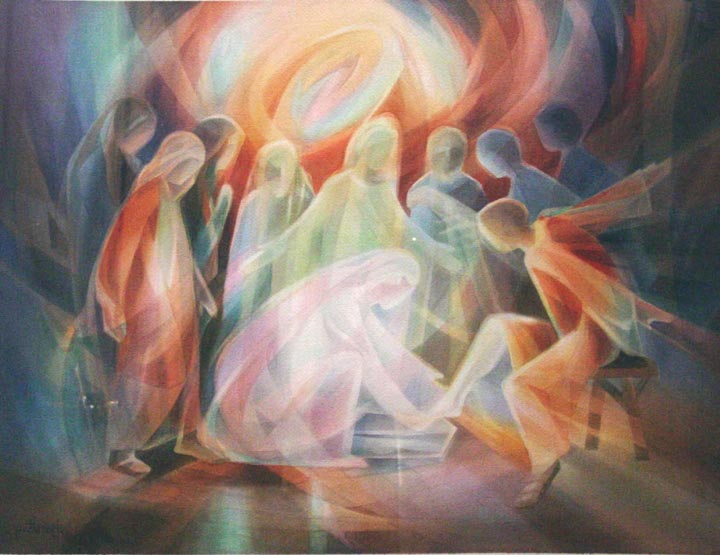"'Just as I have loved you ...'"Throughout the year, the Southern New England Conference of the United Church of Christ reproduces the Daily Lectionary for use by churches. These are the suggested readings for Maundy Thursday, April 1st: Exodus 12:1-14; Psalm 116:1-2, 12-19; John 13:1-17, 31b-35; and 1 Corinthians 11:23-26. I would encourage you to read these short selections as part of your Lenten practice.
The Jewish feast of Passover celebrates God’s deliverance of His people from slavery. It is a religious festival of liberation. As we read today in Exodus, “This day shall be a day of remembrance for you.” It is still observed piously among our Jewish brothers and sisters. This year it began on Saturday evening of this past weekend and it will continue through evening this Sunday. 2,000 years ago, Jews from the diaspora throughout the Roman Empire were coming back to the holy city of Jerusalem in order to perform the sacred rites that could only take place at the Temple. This was a joyous season, and an awe inspiring one. Many of the pilgrims to Jerusalem may have come to see the Temple but this one time in their lives. I would imagine that they felt the closeness of God. We encounter that same sense of continuity with Jesus’ last Passover, His Last Supper. Paul today uses technical language when he writes to the Corinthians: “For I received from the Lord what I also handed on to you …” This is the purposeful language that indicates Paul is maintaining a tradition that has been received and handed-on with a special emphasis upon accuracy. What this means is that in the earliest church there was already a reverence for the sacrament of the Lord’s Supper. I have mentioned several times the story of my transition from a Catholic to a Protestant denomination. I was taking the UCC’s Polity Course at Camp Calumet for two weeks. The course ended with our sharing of Holy Communion. This would be the first time that I had accepted Holy Communion in a Protestant denomination. When I shared in Holy Communion, even though I obviously knew that there were theological differences in the way it was understood by Protestants and Catholics, I still felt the sanctity of the sacrament. It still brought me closer to Jesus in some special spiritual/psychological way. The theology was different, but the experience was the same. The special reverence of what began at Jesus’ last Passover meal, His Last Supper, continues to our present and surely beyond. As our Jewish brothers and sisters observe the Passover and feel the closeness of God and celebrate the liberation He gifts them with, so we observe Maundy Thursday. We have received and continue to pass on the sacred tradition of Jesus’ mystical presence in the sacrament and the liberation He achieves for us through His life and His quickly approaching death. Maundy Thursday derives its name from the Latin word for commandment, mandatum. The commandment is told to us in today’s Gospel selection: “‘I, your Lord and Teacher, have washed your feet, you also ought to wash one another’s feet. For I have set you an example, that you also should do as I have done to you. … I give you a new commandment, that you love one another. Just as I have loved you, you also should love one another. By this everyone will know that you are my disciples, if you have love for one another.’” This is not a nebulous call to love one another as we so choose. Jesus commands that we love “[j]ust as I have loved you.” And Jesus had just displayed that love in the shocking reversal of roles when the teacher takes on the appearance and duties of the servant and washes the feet of the disciples. “‘I have set you an example,’” says Jesus. Christian love is equated with Christian service. We express our love not easily with words, but with what we do for one another. I leave you with this thought. In Matthew, Mark and Luke, the primary focus of attention at the Last Supper is Jesus’ institution of Holy Communion. In John alone, the last written Gospel of the four, Communion was taken out of the closed Upper Room and shared widely among the throngs gathered on a mountainside. The focus of John’s Last Supper is Jesus’ “new commandment.” John has had the chance to witness Paul’s “received and handed on” importance of the Lord’s Supper. He may have had some sort of awareness of the Synoptic Gospels’ Last Supper accounts. Did any of this influence John’s decision to instead focus the Last Supper’s attention on the “new commandment”? Was it not to detract from the tradition of Holy Communion instituted at the Last Supper, but to add on to it the necessity that Christians who share in Jesus’ mystical presence in Communion must likewise, with equal sanctity, live in imitation of Jesus’ love as humble service unto each other? I encourage you and I invite you to join other Christians worldwide as this night we continue to remember Jesus’ Last Supper and to celebrate the gift of His eternal presence among us through the gift of Holy Communion. If you’d like, here is the link to the Southern New England Conference’s daily reading schedule: www.sneucc.org/lectionary.
0 Comments
Leave a Reply. |
NewsFaith, love and chitchat. Categories
All
Archives
June 2024
Follow
|
|
SERVICE TIMES
Sunday 9:30-10:30am Children Sunday School 9:30-10:30am Nursery care available during worship DONATE Make a single or recurring contribution by clicking here |
FOLLOW
|


 RSS Feed
RSS Feed
